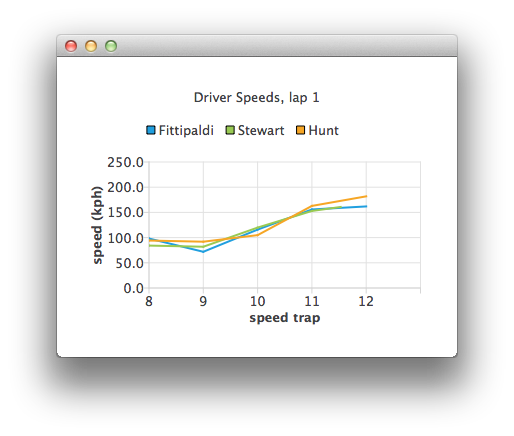QMLでリストモデルをデータソースとして使う
注: これはCharts with QML Galleryの例の一部です。

まずは空のChartView を定義してみましょう:
ChartView { id: chartView title: "Driver Speeds, lap 1" anchors.fill: parent legend.alignment: Qt.AlignTop animationOptions: ChartView.SeriesAnimations antialiasing: true }
この ListModel はハードコードされたテストデータを使用しています。実際のアプリケーションでは、データソースは計時システムでしょう。
ListModel { // Hard-coded test data ListElement { speedTrap:0; driver: "Fittipaldi"; speed:104.12 } ListElement { speedTrap:0; driver:"Stewart"; speed:106.12 } ListElement { speedTrap:0; driver:"Hunt"; speed:106.12 } ... // An example ListModel containing F1 legend drivers' speeds at speed traps SpeedsList { id: speedsList Component.onCompleted: { timer.start(); } }
データはタイマーで解析されます。各ドライバーを表す行系列はオンザフライで作成されます。
// A timer to mimic refreshing the data dynamically Timer { id: timer interval: 700 repeat: true triggeredOnStart: true running: false onTriggered: { root.currentIndex++; if (root.currentIndex < speedsList.count) { // Check if there is a series for the data already // (we are using driver name to identify series) var lineSeries = chartView.series(speedsList.get(root.currentIndex).driver); if (!lineSeries) { lineSeries = chartView.createSeries(ChartView.SeriesTypeLine, speedsList.get(root.currentIndex).driver); chartView.axisY().min = 0; chartView.axisY().max = 250; chartView.axisY().tickCount = 6; chartView.axisY().titleText = "speed (kph)"; chartView.axisX().titleText = "speed trap"; chartView.axisX().labelFormat = "%.0f"; } lineSeries.append(speedsList.get(root.currentIndex).speedTrap, speedsList.get(root.currentIndex).speed); if (speedsList.get(root.currentIndex).speedTrap > 3) { chartView.axisX().max = Number(speedsList.get(root.currentIndex).speedTrap) + 1; chartView.axisX().min = chartView.axisX().max - 5; } else { chartView.axisX().max = 5; chartView.axisX().min = 0; } chartView.axisX().tickCount = chartView.axisX().max - chartView.axisX().min + 1; } else { // No more data, change x-axis range to show all the data timer.stop(); chartView.animationOptions = ChartView.AllAnimations; chartView.axisX().min = 0; chartView.axisX().max = speedsList.get(root.currentIndex - 1).speedTrap; } } }
© 2025 The Qt Company Ltd. Documentation contributions included herein are the copyrights of their respective owners. The documentation provided herein is licensed under the terms of the GNU Free Documentation License version 1.3 as published by the Free Software Foundation. Qt and respective logos are trademarks of The Qt Company Ltd. in Finland and/or other countries worldwide. All other trademarks are property of their respective owners.

